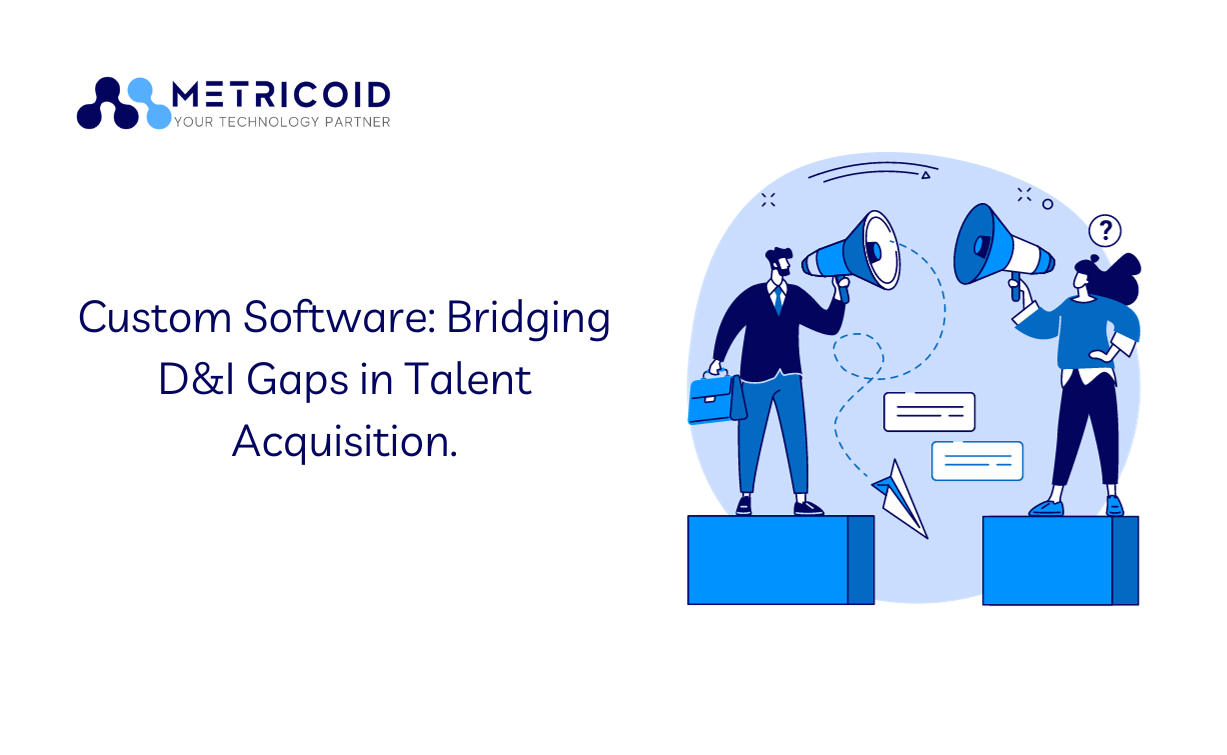Custom Software: Bridging D&I Gaps in Talent Acquisition.

Diversity and inclusion (D&I) are strategic imperatives for businesses trying to innovate and remain competitive in today’s globally linked economy. According to a McKinsey analysis, organizations in the top quartile for gender diversity on executive teams were 21% more likely to have above-average profitability than those in the worst quartile. But how can technology, notably custom software, be used to promote D&I in hiring?

Table Of Contents
Bias in Traditional Hiring Methods
Despite the greatest intentions, traditional recruiting practices can occasionally harbor unconscious prejudices. From resume names influencing callback rates to prejudices influencing interviews, these biases may have a substantial impact on the recruiting process. According to Harvard Business Review research, small biases can influence hiring decisions even when interviewers feel they are being fair.
Custom Software: The Bias Eliminator
Custom software solutions, infused with artificial intelligence, offer an unbiased and efficient alternative to traditional recruitment processes. By analyzing vast amounts of data, these algorithms can:
- Screen Resumes Impartially: By focusing purely on skills, experiences, and qualifications without considering names, gender, ethnicity, or other potentially biasing information.
- Analyze Job Descriptions: Software can help ensure that job listings use neutral language, attracting a wider array of candidates without unintentional gender or cultural biases.
- Structured Interviews: Algorithms can suggest structured, consistent interview questions that focus on competencies and skills, ensuring every candidate gets a fair shot.
Customized Reporting for Transparency
The capacity to give real-time data and analytics is one of the most significant benefits of bespoke software. Startups may develop customized reports on their recruiting practices, which will assist them in identifying any unintended bias trends and tracking their progress in fostering diversity over time.
Driving a Cultural Change
While technology may be an important tool, fostering diversity and inclusion should also be a cultural endeavor. Custom software solutions work best when integrated with larger efforts such as diversity training, mentorship programs, and a top-down commitment to inclusiveness.
Beyond Hiring: Integrating D&I in Every Workflow
While hiring is a critical area where custom software can foster diversity and inclusion, its potential doesn’t stop there. The true power of such tools is realized when they’re integrated into every facet of an organization.
- Team Collaboration: Using software platforms that promote inclusivity can make everyone feel heard and valued. This can be achieved through features that facilitate anonymous feedback or provide equal speaking opportunities during virtual meetings.
- Tailored Training Programs: Custom software can be used to create personalized training modules focusing on D&I. These programs can help educate employees on the importance of diversity, highlight unconscious biases, and suggest ways to foster an inclusive environment.
- Performance Reviews: By implementing algorithms that ensure impartiality, custom software can help managers provide unbiased feedback, ensuring that all employees are judged solely based on their performance and not influenced by subconscious biases.
Feedback Mechanisms for Continuous Improvement
Receiving feedback is a crucial step in understanding and improving any system, and this holds true for D&I initiatives. Custom software can incorporate features that allow employees to provide feedback on D&I initiatives, offering insights into areas of improvement.
- Anonymous Feedback Portals: Employees can share their experiences, concerns, or suggestions without fear of retribution.
- Surveys & Questionnaires: Periodic surveys can be conducted to gauge the overall sentiment of the workforce towards the company’s D&I efforts.
Custom Software as a Reflective Tool
As startups grow and evolve, so too will their D&I objectives and challenges. Custom software, with its scalability and adaptability, can mirror this evolution. By continuously updating and refining algorithms based on real-world data and feedback, these tools can stay relevant and effective.
By effectively harnessing these advanced tools, startups not only demonstrate their commitment to D&I but also lay the groundwork for a holistic, inclusive environment that permeates every layer of the organization. This holistic approach ensures that diversity and inclusion are not just recruitment checkboxes but integral components of a company’s ethos and daily operations.
Data Analytics: The Power to Predict and Prevent Biases
Advanced analytics, when incorporated into custom software, offers the capacity to understand patterns, predict potential pitfalls, and preemptively address issues related to biases. This proactive approach is a game-changer for startups aiming to stay ahead in their D&I efforts.
- Bias Identification: Custom algorithms can be trained to spot language patterns or actions that may suggest biases in written communications or official documents.
- Predictive Analysis: By analyzing past data, the software can predict areas or processes that might become vulnerable to biases in the future, allowing companies to intervene proactively.
- Real-time Reporting: Instant alerts on potential bias incidents can be set up, ensuring immediate corrective actions and minimizing the impact of such incidents.
Personalized Employee Experience
A one-size-fits-all approach is rarely effective, especially when considering the diverse backgrounds and experiences of employees. Custom software can provide tailored experiences that cater to the unique needs of each individual, fostering a sense of belonging and inclusivity.
- Language and Communication Tools: Features such as real-time translation, ensure that language isn’t a barrier in a diverse workspace.
- Cultural Calibration: Software can be designed to recognize and celebrate various global festivals or significant days, promoting cultural understanding and bonding among employees.
Transparency: Building Trust Through Visibility
Startups often face the challenge of establishing trust, both internally among employees and externally with stakeholders. Demonstrating a commitment to D&I through transparent actions can significantly bolster this trust factor.
- Open Reporting: Platforms that showcase real-time data on hiring trends, promotions, and pay scales based on diverse categories, ensuring there’s no disparity.
- Employee Stories: Highlighting experiences and testimonials of employees from diverse backgrounds, showcasing the company’s commitment to D&I in action and not just words.
Conclusion
Using the power of bespoke software in the hiring process may have a significant impact on a startup’s commitment to diversity and inclusion. It’s an option that modern businesses can’t afford to ignore, with benefits ranging from decreased prejudices to more diverse labor pools. As technology advances, including these tools in recruiting, practices will become not just useful but also necessary for businesses aspiring to be industry leaders.






